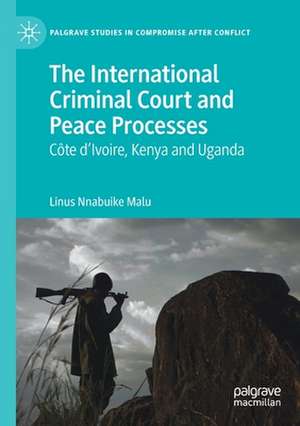The International Criminal Court and Peace Processes: Cȏte d’Ivoire, Kenya and Uganda: Palgrave Studies in Compromise after Conflict
Autor Linus Nnabuike Maluen Limba Engleză Paperback – 14 aug 2020
Relying on qualitative studies in these countries, this book comparatively analyses the impact of the interventions of the ICC in Uganda (2004), Kenya (after the 2007/2008 post-election violence), and Cȏte d’Ivoire. Its aim is to provide an evidence-based account of how the involvement of the ICC in these countries influences the processes of promoting peace. To gauge this, Malu develops an analytical framework which is based on four variables: deterrence, victims’ rights, reconciliation and accountability to the law. This book will appeal to those interested in post-conflict reconstruction, transitional justice, peace studies, conflict transformation, and international criminal law, including peace practitioners and those working in the field of international justice.
| Toate formatele și edițiile | Preț | Express |
|---|---|---|
| Paperback (1) | 582.63 lei 6-8 săpt. | |
| Springer International Publishing – 14 aug 2020 | 582.63 lei 6-8 săpt. | |
| Hardback (1) | 586.70 lei 6-8 săpt. | |
| Springer International Publishing – 18 iun 2019 | 586.70 lei 6-8 săpt. |
Din seria Palgrave Studies in Compromise after Conflict
- 18%
 Preț: 727.80 lei
Preț: 727.80 lei -
 Preț: 332.14 lei
Preț: 332.14 lei -
 Preț: 380.63 lei
Preț: 380.63 lei -
 Preț: 387.75 lei
Preț: 387.75 lei - 15%
 Preț: 642.03 lei
Preț: 642.03 lei -
 Preț: 387.20 lei
Preț: 387.20 lei - 15%
 Preț: 640.06 lei
Preț: 640.06 lei - 18%
 Preț: 953.20 lei
Preț: 953.20 lei - 18%
 Preț: 783.50 lei
Preț: 783.50 lei - 18%
 Preț: 730.35 lei
Preț: 730.35 lei - 18%
 Preț: 730.65 lei
Preț: 730.65 lei - 18%
 Preț: 789.83 lei
Preț: 789.83 lei - 15%
 Preț: 591.79 lei
Preț: 591.79 lei - 15%
 Preț: 527.79 lei
Preț: 527.79 lei - 15%
 Preț: 697.15 lei
Preț: 697.15 lei - 15%
 Preț: 528.13 lei
Preț: 528.13 lei - 5%
 Preț: 1286.08 lei
Preț: 1286.08 lei - 15%
 Preț: 636.63 lei
Preț: 636.63 lei - 18%
 Preț: 783.50 lei
Preț: 783.50 lei - 15%
 Preț: 640.06 lei
Preț: 640.06 lei - 18%
 Preț: 725.61 lei
Preț: 725.61 lei -
 Preț: 319.81 lei
Preț: 319.81 lei - 15%
 Preț: 640.06 lei
Preț: 640.06 lei
Preț: 582.63 lei
Preț vechi: 685.45 lei
-15% Nou
Puncte Express: 874
Preț estimativ în valută:
111.48€ • 116.40$ • 92.27£
111.48€ • 116.40$ • 92.27£
Carte tipărită la comandă
Livrare economică 04-18 aprilie
Preluare comenzi: 021 569.72.76
Specificații
ISBN-13: 9783030199074
ISBN-10: 303019907X
Pagini: 265
Ilustrații: XXII, 265 p. 1 illus.
Dimensiuni: 148 x 210 mm
Greutate: 0.38 kg
Ediția:1st ed. 2019
Editura: Springer International Publishing
Colecția Palgrave Macmillan
Seria Palgrave Studies in Compromise after Conflict
Locul publicării:Cham, Switzerland
ISBN-10: 303019907X
Pagini: 265
Ilustrații: XXII, 265 p. 1 illus.
Dimensiuni: 148 x 210 mm
Greutate: 0.38 kg
Ediția:1st ed. 2019
Editura: Springer International Publishing
Colecția Palgrave Macmillan
Seria Palgrave Studies in Compromise after Conflict
Locul publicării:Cham, Switzerland
Cuprins
1. Introduction.- 2. Analysis Of Some Background Issues.- 3. Violent Conflicts In Africa: Types, Trends, Challenges And The International Criminal Court.- 4. The International Criminal Court And The Peace Process In Uganda.- 5. The International Criminal Court And The Peace Process In Kenya.- 6. The International Criminal Court And The Peace Process In Cote D’ Ivoire.- 7. Comparative Analysis Of The Consequences Of The Involvement Of The ICC In Cote D’ Ivoire, Kenya, And Uganda.- 8. Conclusions And Recommendations.
Notă biografică
Linus Nnabuike Malu is Head of the Legal Department and Access to Justice Manager (Malawi) for the Church of Scotland. He worked for several years as a legal practitioner and Project Coordinator of the Pan African Strategic and Policy Research Group (PANAFSTRAG). Linus has an MA in International Law and the Settlement of Disputes from the University for Peace, Costa Rica, and a PhD from the University of New England, Australia. He is the author of Media Law and Policy in Nigeria, Malthouse Law Books, 2016.
Textul de pe ultima copertă
This book explores the extent to which the International Criminal Court (ICC) has influenced peace processes in Cȏte d’Ivoire, Kenya and Uganda. It examines how the prosecution of those who bear the greatest responsibility for crimes committed in these countries may have negatively or positively influenced the process of making peace in their wake. It is concerned with how international accountability affects post-conflict countries and what the ICC brings to peace processes. The central question addressed by the book is whether justice spurs peace in post- conflict societies or whether justice complicates the peace process. If so, how?
Caracteristici
Examines some of the controversies around the involvement of international justice mechanisms in conflict and post-conflict situations Asks which aspects of the work of international justice mechanisms promote which aspects of the peace process Draws on on qualitative research conducted in Nigeria, C?te d’ Ivoire, Kenya, Ghana and Uganda to provide a comparative analysis Appeals to those interested in post-conflict reconstruction, transitional justice, peace studies, conflict transformation, and international criminal law
